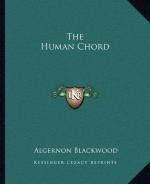It was all very strange and puzzling. He tried, however, to keep an open mind and struggle as best he might with these big swells that rolled into his little pool of life and threatened to merge it in a vaster tide than he had yet dreamed of. Knowing how limited is the world which the senses report, he saw nothing too inconceivable in the idea that certain persons might possess a peculiar inner structure of the spirit by which supersensuous things can be perceived. And what more likely than that a man of Mr. Skale’s unusual caliber should belong to them? Indeed, that the clergyman possessed certain practical powers of an extraordinary description he was as certain as that the house was not empty as he had at first supposed. Of neither had he proof as yet; but proof was not long in forthcoming.
Chapter IV
I
“Then if there is so much sound about in all objects and forms—if the whole universe, in fact, is sounding,” asked Spinrobin with a naive impertinence not intended, but due to the reaction of his simple mind from all this vague splendor, “why don’t we hear it more?”
Mr. Skale came upon him like a boomerang from the end of the room. He was smiling. He approved the question.
“With us the question of hearing is merely the question of wavelengths in the air,” he replied; “the lowest audible sound having a wavelength of sixteen feet, the highest less than an inch. Some people can’t hear the squeak of a bat, others the rumble of an earthquake. I merely affirm that in every form sleeps the creative sound that is its life and being. The ear is a miserable organ at best, and the majority are far too gross to know clair-audience. What about sounds, for instance, that have a wavelength of a hundred, a thousand miles on the one hand, or a millionth part of an inch on the other?”
“A thousand miles! A millionth of an inch?” gasped the other, gazing at his interlocutor as though he was some great archangel of sound.
“Sound for most of us lies between, say, thirty and many thousand vibrations per second—the cry of the earthquake and the cricket; it is our limitation that renders the voice of the dewdrop and the voice of the planet alike inaudible. We even mistake a measure of noise—like a continuous millwheel or a river, say—for silence, when in reality there is no such thing as perfect silence. Other life is all the time singing and thundering about us,” he added, holding up a giant finger as though to listen. “To the imperfection of our ears you may ascribe the fact that we do not hear the morning stars shouting together.”
“Thank you, yes, I quite see now,” said the secretary. “To name truly is to hear truly.” The clergyman’s words seemed to hold a lamp to a vast interior map in his mind that was growing light. A new dawn was breaking over the great mental prairie where he wandered as a child. “To find the true name of anything,” he added, “you mean, is to hear its sound, its individual note as it were?” Incredible perspectives swam into his ken, hitherto undreamed of.




